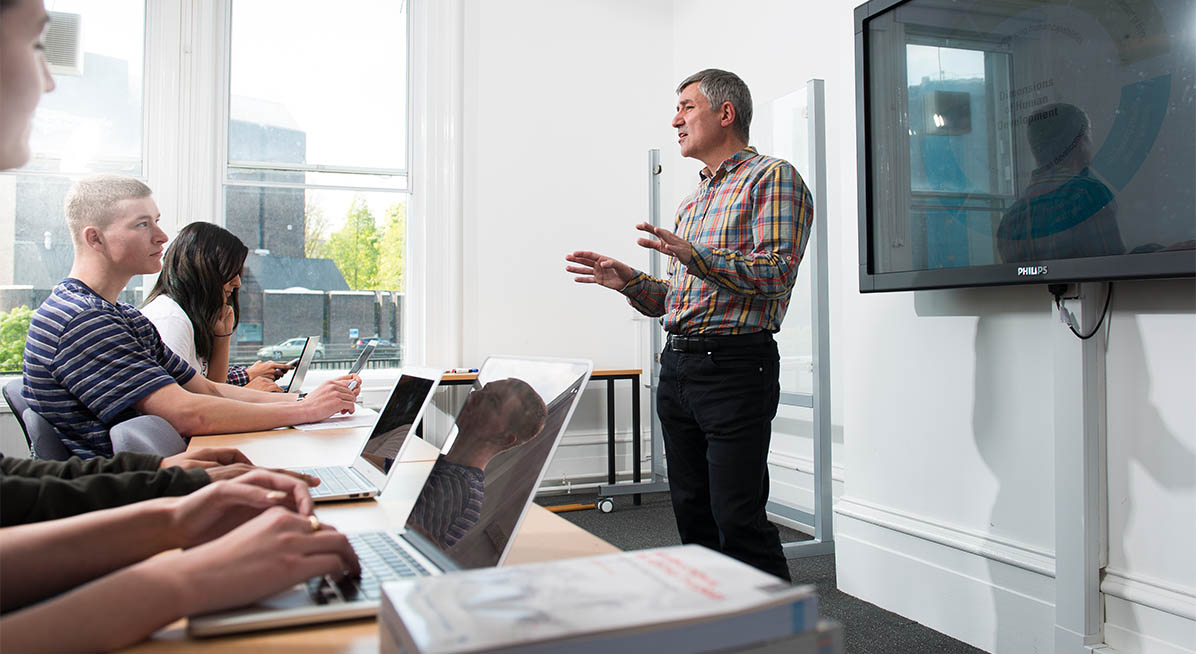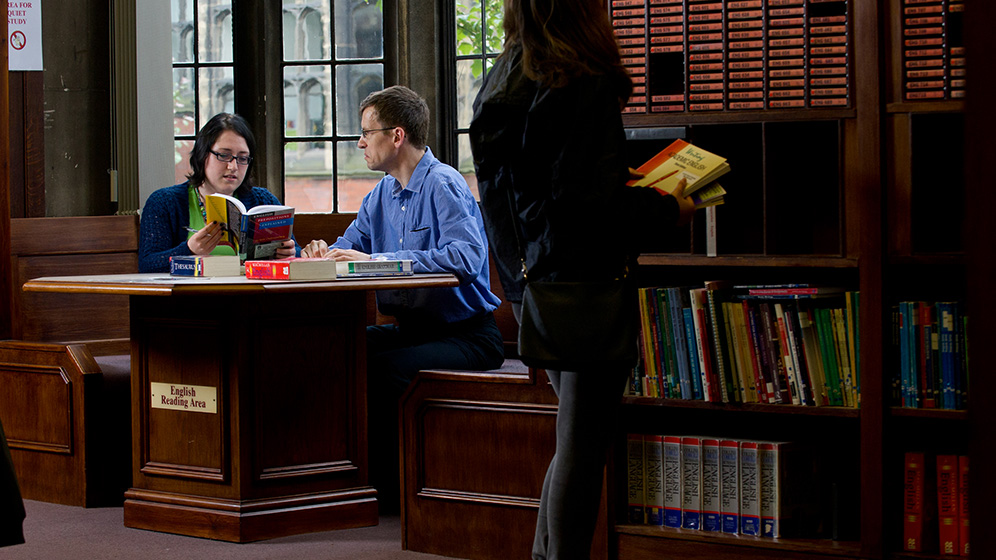Politics and History BA Honours
- UCAS code: VL12
- Full time
- 3 years
Explore the key political issues facing us today and the historical events behind them on this politics and history degree.
You are currently viewing course information for entry year: 2026
Next start date:
- September 2026
UCAS Institution name and code:
- NEWC / N21
Course overview
Our three-year joint honours degree focuses on developing your skills and abilities to critically analyse historical and political topics. You'll graduate as a confident independent learner with specialist knowledge in your own areas of interest.
Follow your own path, choosing to study modules which are closely related, or cast your net wide, studying topics that span six continents.
Study in a research-led environment, alongside scholars at the forefront of their fields.
Improve your research skills, completing a range of research projects during your degree.
In history, you'll explore themes including:
- revolution
- slavery
- radicalism
- medical history
- religion
- public engagement with the past
across a variety of periods, geographies and cultures. In politics, you'll look at global politics, political philosophy and international relations.

Your course and study experience - disclaimers and terms and conditions
Please rest assured we make all reasonable efforts to provide you with the programmes, services and facilities described. However, it may be necessary to make changes due to significant disruption, for example in response to Covid-19.
View our Academic experience page, which gives information about your Newcastle University study experience for the academic year 2025-26.
See our terms and conditions and student complaints information, which gives details of circumstances that may lead to changes to programmes, modules or University services.
Quality and ranking
Professional accreditation and recognition
All professional accreditations are reviewed regularly by their professional body.
Modules and learning
Modules
The information below is intended to provide an example of what you will study.
Most degrees are divided into stages. Each stage lasts for one academic year, and you'll complete modules totalling 120 credits by the end of each stage.
Our teaching is informed by research. Course content may change periodically to reflect developments in the discipline, the requirements of external bodies and partners, and student feedback.
Optional module availability
Student demand for optional modules may affect availability.
Full details of the modules on offer will be published through the Programme Regulations and Specifications ahead of each academic year. This usually happens in May.
To find out more please see our terms and conditions
You'll build a foundation to become an independent learner and critical reader/thinker through compulsory modules.
Optional modules give an overview of our range, whether that be the major pathways in Politics (such as political thought and international politics), or the chronological and cultural variety of History.
Modules
| Compulsory Modules | Credits |
|---|---|
| Evidence and Argument | 20 |
| Order and Disorder: The Shaping of the 21st Century | 20 |
You’ll choose six optional modules in total – three each from Politics and History. Through these modules you’ll deepen your subject knowledge and build on your skills from Stage One.
You'll critically engage with the topics you're studying and become a confident participant in our learning community. If you are thinking about undertaking an optional dissertation in Stage Three, you’ll select modules to prepare you for this.
Modules
You will continue to study a mixture of Politics and History modules. This can be through an even split of modules, or a weighting towards History or Politics. You may include a research dissertation in either subject or a research or community-partnership project on a political theme or issue.
Through study in the recommended modules you'll critically reflect on History and your own ideas through close study of an influential work. You can also broaden your horizons by considering the uses and abuses of history in public life.
Modules
We base these figures and graphs on the most up-to-date information available to us. They are based on the modules chosen by our students in 2024-25.
Teaching time is made up of:
- scheduled learning and teaching activities. These are timetabled activities with a member of staff present.
- structured guided learning. These are activities developed by staff to support engagement with module learning. Students or groups of students undertake these activities without direct staff participation or supervision
Teaching and assessment
Teaching methods
Most of your modules will be delivered through lectures, seminars and workshops. Seminars become more important in Stage 2 and 3, reflecting your development into a confident and skilled independent learner and part of the School's wider learning community.
In Politics, you can also focus on public speaking, with in-class debates used to test, defend and refine your ideas.
Assessment methods
You'll be assessed through a combination of:
-
Dissertation or research project
-
Essays
-
Examinations – practical or online
-
Group work
-
Portfolio submission
-
Presentations
-
Projects
-
Reflective report/journal
Skills and experience
Practical skills
You'll have the opportunity to gain first-hand experience carrying out community-based politics research. You'll support a local institution or non-governmental organisation and apply some of your learned skills in the workplace.
Research skills
You'll be able to choose to complete an independent research project in Stage 3. You can either complete a dissertation, or the more practical option of hands-on research within the community.
You'll learn to plan, develop and implement a project, while contributing to academic knowledge, or having an impact on the community.
Opportunities
Study abroad
Experience life in another country by choosing to study abroad as part of your degree. You’ll be encouraged to embrace fun and challenging experiences, make connections with new communities and graduate as a globally aware professional, ready for your future.
You can choose to spend up to a year studying at a partner institution overseas.
If you choose to study abroad, it will extend your degree by a year.
Find out more about study abroad
Work placement
Get career ready with a work placement and leave as a confident professional in your field. You can apply to spend 9 to 12 months working in any organisation in the world, and receive University support from our dedicated team to secure your dream placement. Work placements take place between stages 2 and 3.
You'll gain first-hand experience of working in the sector, putting your learning into practice and developing your professional expertise.
If you choose to take a work placement, it will extend your degree by a year, and your degree title will show you have achieved the placement year. A work placement is not available if you're spending a year studying abroad. Placements are subject to availability.
Facilities and environment
Facilities
You'll be based at our city-centre campus between the School of History, Classics and Archaeology, in the historic Armstrong Building and the School of Geography, Politics and Sociology, in the recently refurbished Henry Daysh Building.
You'll have access to a range of on-campus facilities, including:
- the Philip Robinson University Library, which houses over 800,000 books and provides access to ca. 1.8m e-books
- Special Collections & Archives – a rich collection of archival material, historical medical texts and rare books
- The Great North Museum: Hancock, our on-campus museum which holds an extensive collection of Greek, Roman, and Etruscan artefacts
Support
You'll have the support of an academic member of staff as a personal tutor throughout your degree to help with academic and personal issues.
Peer mentors will help you in your first year. They are fellow students who can help you settle in and answer any questions you have when starting university.
Your future
Join our network of successful graduates
On graduation from our degree courses, you will have the proven ability to think critically, assess complex material and data, carry out research, construct a well-informed argument and articulate it on paper and in person.
Some of our graduates have used this powerful combination of skills to progress directly into careers in politics, economics and international relations – for employers such as the Houses of Parliament, HM Treasury, local government, the Civil Service, inter-governmental organisations and public affairs consultancies.
Others have applied their skills with equal success in the media, law, finance, management consultancy, education, human resources, marketing, business and academia.
Our Politics graduates include MPs in Westminster, fast-track civil servants in the Cabinet Office and Department for Work and Pensions, parliamentary researchers, and Brussels-based public affairs consultants.
Our staff also maintain strong links with governmental bodies such as the UK and Scottish Parliaments, NATO and the EU.
Make a difference
Sorry, you need JavaScript to view this video
Careers support
You'll benefit from targeted careers support throughout your degree. In your induction week, you'll explore potential career paths.
In Stage 2, you can apply for a work placement with a local political party or charity. In Stage 3 you can boost your prospects by conducting policy research on behalf of a local community organisation.
Our Careers Service is one of the largest and best in the country, and we have strong links with employers. We provide an extensive range of opportunities to all students through our ncl+ initiative.
Visit our Careers Service website
Recognition of professional qualifications outside of the UK
If you’re studying an accredited degree and thinking about working in Europe after you graduate, the best place to find current information is the UK Government’s guidance on recognition of UK professional qualifications in EU member states. This official resource explains whether your profession is regulated in another country, what steps you need to take, and which organisation you should contact.
Entry requirements
All candidates are considered on an individual basis and we accept a broad range of qualifications.
The entrance requirements and offers below apply to 2026 entry.
| A-Level | |
|---|---|
| International Baccalaureate | |
|---|---|
Other UK and the Republic of Ireland qualifications
Alternative offers at Newcastle
Through one of our contextual or alternative offer routes, you could receive an offer of up to three grades lower than the typical requirements.
Contextual offers
We use certain contextual data from your UCAS form, alongside your application, to consider challenges that you may have faced in your education and the potential effect this may have had on your qualifications. This means you may be eligible to receive a lower contextual offer.
PARTNERS offers
One of the largest and longest support entry routes to university of its kind for students from underrepresented backgrounds. We support applicants from application through to study.
Realising Opportunities offers
A unique programme delivered in collaboration with 10 leading, research-intensive universities in the UK. The programme is open to students in Year 12/first year of college.
Pathways to Newcastle offers
Pathways to Newcastle, our national skills entry route, is available for specific subject areas.
High Performance Athletes
We support promising athletes at the application stage, who compete in regional, national or international levels in their sport.
Qualifications from outside the UK
English Language requirements
Entrance courses (INTO)
International Pathway courses are specialist programmes designed for international students who want to study in the UK. We provide a range of study options for international students in partnership with INTO.
These courses are specifically designed for international students who want to study in the UK and progress onto one of our undergraduate degrees. Our International Study Centre, has a range of study options including:
- International Foundation
- International Year One
- English Language courses
Find out more about International Pathway courses
Admissions policy
This policy applies to all undergraduate and postgraduate admissions at Newcastle University. It is intended to provide information about our admissions policies and procedures to applicants and potential applicants, to their advisors and family members, and to staff of the University.
University Admissions Policy and related policies and procedures
Credit transfer and Recognition of Prior Learning
Recognition of Prior Learning (RPL) can allow you to convert existing relevant university-level knowledge, skills and experience into credits towards a qualification. Find out more about the RPL policy which may apply to this course.
Tuition fees and scholarships
Tuition fees for academic year 2026-2027
The 2026 entry home fees have not yet been confirmed.
| Qualification: BA Honours | |
|---|---|
|
Home students full time 3 years |
Tuition fees (Year 1)
Not set |
|
International students full time 3 years |
Tuition fees (Year 1)
24,500 |
Year abroad and additional costs
For programmes where you can spend a year on a work placement or studying abroad, you will receive a significant fee reduction for that year.
Some of our degrees involve additional costs which are not covered by your tuition fees.
Scholarships
Find out more about:
Open days and events
You'll have a number of opportunities to meet us throughout the year at our on-campus and virtual open days.
You'll be able to:
- explore our beautiful campus
- find out about our vibrant city
- discover what students think about studying at Newcastle
You'll also have the opportunity to speak to academic staff and find out more about the subjects you're interested in.
Find out about how you can visit Newcastle in person and virtually.
We regularly travel overseas to meet with students interested in studying at Newcastle University. Visit our events calendar to find out when we're visiting your region.
How to apply
Apply through UCAS
To apply for undergraduate study at Newcastle University, you must use the online application system managed by the Universities and Colleges Admissions Service (UCAS). All UK schools and colleges, and a small number of EU and international establishments, are registered with UCAS. You will need:
- the UCAS name and institution codes for Newcastle University (NEWC/N21)
- the UCAS code for the course you want to apply for
- the UCAS 'buzzword' for your school or college
If you are applying independently, or are applying from a school or college which is not registered to manage applications, you will still use the Apply system. You will not need a buzzword.
Apply through UCASApply through an agent
International students often apply to us through an agent. Have a look at our recommended agents and get in touch with them.
Get in touch
By phone
Call us on +44 (0) 191 208 3333 and press option 1. Our opening hours are Monday to Friday 10am until 4pm.
Live chat
Our NCL chatbot might be able to give you an answer straight away. If not, it’ll direct you to someone who can help.
You'll find our NCL chatbot in the bottom right of this page.
Online
Keep updated
We regularly send email updates and extra information about the University.
Receive regular updates by email









